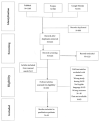Quality of Life after Bariatric Surgery-A Systematic Review
- PMID: 35897447
- PMCID: PMC9330722
- DOI: 10.3390/ijerph19159078
Quality of Life after Bariatric Surgery-A Systematic Review
Abstract
Background: Most studies analyzing the health-related quality of life (HRQOL) after bariatric treatment ceased at five years post-surgery or even earlier, and it is unclear whether the HRQOL benefit persists for a longer time. This paper reviews sparse evidence regarding HRQOL in patients who underwent bariatric surgery at least nine years prior.
Materials and methods: A of PubMed, Scopus and Google Scholar between 2007-2021 was carried out for the studies investigating HRQOL as an outcome measure in patients after bariatric surgery of any type and having at least a 9-year follow-up. Inconsistent reporting of weight loss or postgraduate study results unrelated to QoL were not included in the study. The study used the PICO procedure.
Results: The review of 18 identified publications demonstrated that bariatric treatment seems to provide a persistent benefit in terms of HRQOL, especially its physical component score. Due to psychological predispositions, some patients appear to be less likely to benefit from bariatric treatment, whether in terms of HRQOL or bodyweight reduction. Inconsistent and imprecise studies may limit the evidence included in a review.
Conclusions: The early identification of such patients and providing them with holistic care, including psychological intervention, would likely further improve the outcomes of bariatric treatment.
Keywords: BAROS; SF-36; bariatric surgery; obesity; quality of life.
Conflict of interest statement
The authors declare no conflict of interest.
Figures
References
-
- World Health Organization (WHO) [(accessed on 31 October 2021)]; Available online: https://www.who.int/news-room/factsheets/%0Ddetail/obesity-and-overweight.
-
- Lim S.S., Vos T., Flaxman A.D., Danaei G., Shibuya K., Adair-Rohani H., Amann M., Anderson H.R., Andrews K.G., Aryee M., et al. A comparative risk assessment of burden of disease and injury attributable to 67 risk factors and risk factor clusters in 21 regions, 1990-2010: A systematic analysis for the Global Burden of Disease Study 2010. Lancet. 2012;380:2224–2260. doi: 10.1016/S0140-6736(12)61766-8. - DOI - PMC - PubMed
-
- Warkentin L.M., Majumdar S.R., Johnson J.A., Agborsangaya C.B., Rueda-Clausen C.F., Sharma A.M., Klarenbach S.W., Birch D.W., Karmali S., McCargar L., et al. Predictors of health-related quality of life in 500 severely obese patients. Obesity. 2014;22:1367–1372. doi: 10.1002/oby.20694. - DOI - PubMed
Publication types
MeSH terms
LinkOut - more resources
Full Text Sources
Medical


